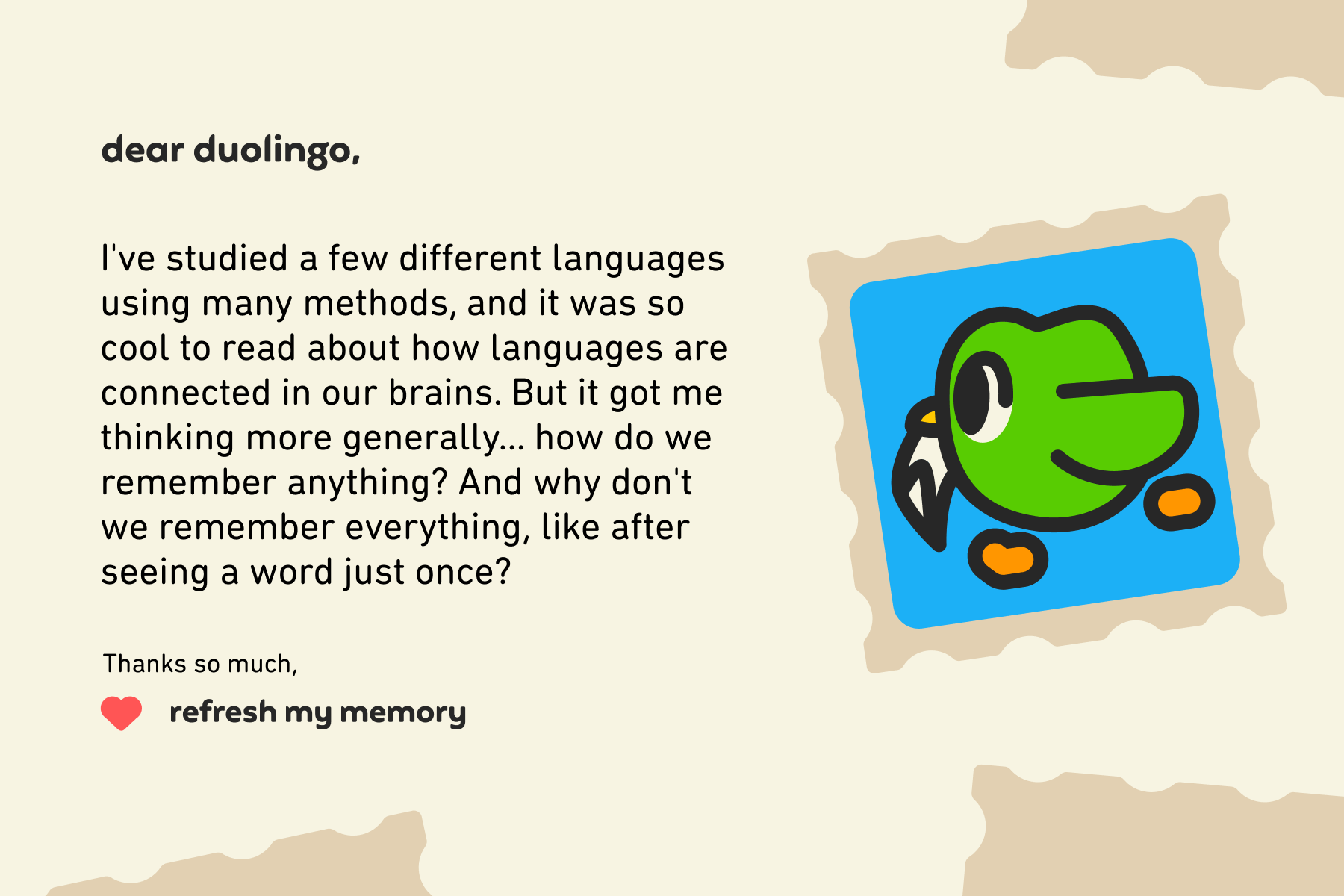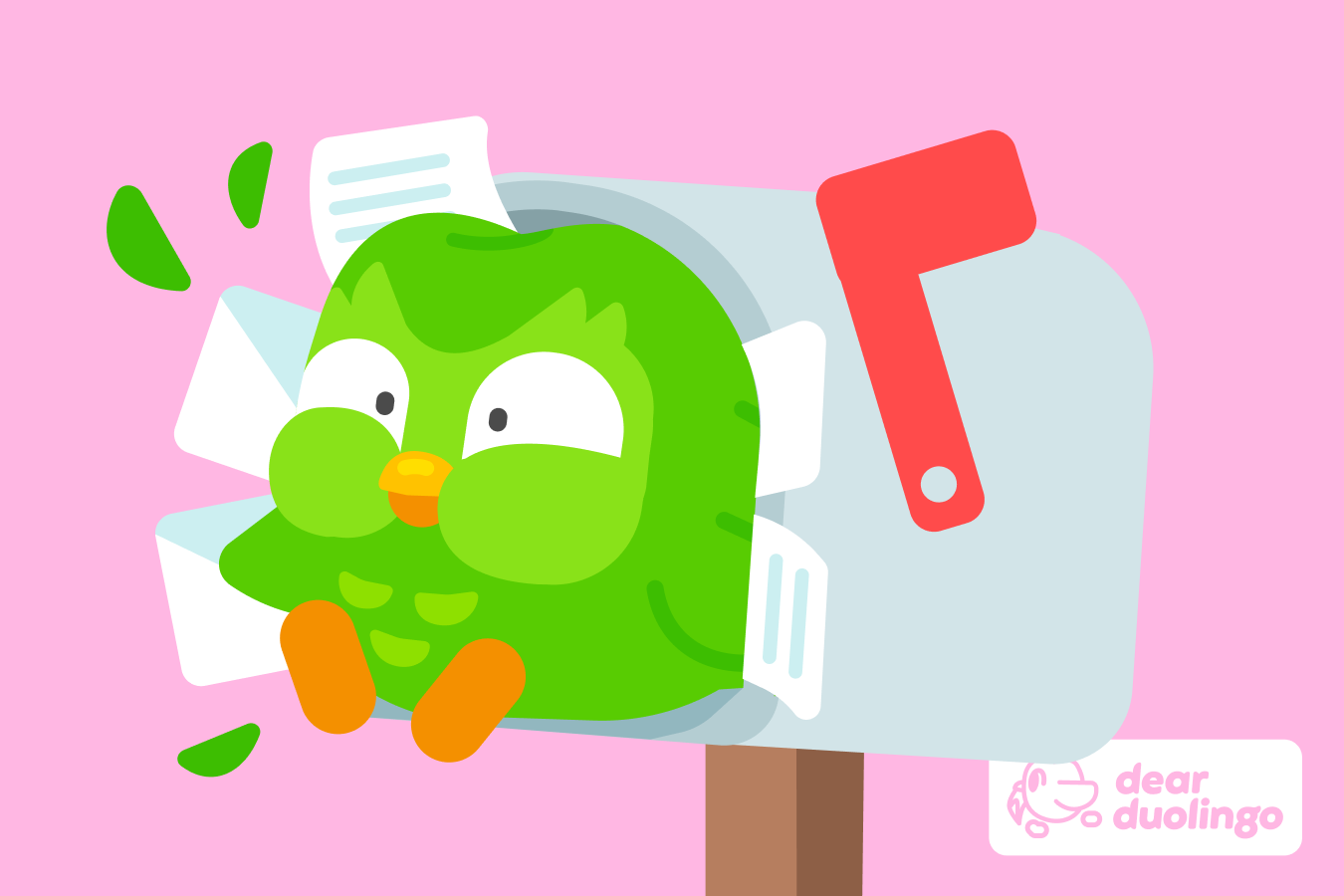Welcome to another week of Dear Duolingo, an advice column just for language learners. Catch up on past installments here.
Howdy! I'm Dr. Ben Reuveni, and I'm a Senior Learning Scientist at Duolingo. My expertise is in memory, learning, and decision making, and at Duolingo I work on creating new features to make learning engaging, like Legendary and Practice Hub. I'm a lifelong language learner and speak 3 languages to varying degrees. Before coming to Duolingo, I developed computer algorithms to better understand how people learn… and now I use those skills to help us teach better! I'm taking over for Cindy this week because she knew how excited I'd be to answer this week's question—and she was right 🤩 I can't wait to jump into my first Dear Duolingo column!
Our question this week:

It really is amazing how much our brains can remember—including things not particularly useful to us, like theme songs from favorite childhood shows—and also how much we don't remember! 😅 So what's going on? What is a memory really, and what is happening when we remember something? And why (seriously, WHYYYY) do we forget things?
Just like with languages, it's all about connections in your brain! And when it comes to remembering things, there are actually many kinds of connections—and many kinds of memory.
What is a memory?
Memory is the result of some experience you and your brain had. You can think of memory as a trace (a physical imprint, like a footprint you leave behind on the sand) that lives in your brain as a connection between neurons and pieces of information. In a very real sense, your brain literally changes when you learn something new!
There are many ways to talk about memory, but in general we have two types of memory:
- Working memory (also called short-term memory): memories that are held in your brain for a brief time (maybe a few seconds or minutes), such as a phone number someone just gave you to call. Once you lose focus on the information, it's gone! And even to keep it in your short-term memory, you have to put in some effort (like repeating that number over and over).
- Long-term memory: memories that are held in your brain long-term and that you can retrieve ("remember"!) without having to deliberately practice them. (They're just there!) Long-term memories can include information that you've learned over a long period of time that gets practiced a lot (like the names of family members or how to ride a bike) or more recent information (like when you recognize a new word that you learned on Duolingo yesterday!). You can pull this information out of your memory again and again, without having to repeat it. (My wife's name is "Amy," my wife's name is "Amy"—don't worry, Amy, you're already in my long-term memory!)
There are two kinds of long-term memory, for different sorts of information:
- Implicit memory: memory about skills and processes, like riding a bike, the movements required to use a can opener… and how to speak your own language! Generally, for skills and processes, being told how to do it doesn't really help you learn it and get that information in your long-term memory.
- Explicit memory: memory about information and facts, like the capital of a country and what you had for breakfast ("eggs," in my case). One type of explicit memory is episodic memory: your ability to mentally time travel, to relive a scene like remembering the last holiday meal you had with family, or that time you watched a beautiful sunset.
When it comes to language learning, we can think about implicit memory being used for having instincts about what sounds right and what words go together (like the instincts you have for your first language!) and explicit memory for describing how the language works (knowing the fact that in English adjectives go before nouns). That's why there's a difference between knowing a language rule and actually being able to use it! Most people don't know all the rules about grammar in their own language (explicit memory), but they can use their language just fine (implicit memory). And if your goal is to use your new language, knowing how to describe a verb conjugation isn't what helps you get to your goal.
How do we remember things?
Forming a new memory (aka, learning) involves forming up new brain connections. “Remembering” that memory is the process of finding that connection and accessing the memory.
Let's take an example of explicit memory (that's the one for facts). If we're trying to learn something (like words in a new language), we repeat it a bunch of times (ahem, like by developing a streak), focus on it, and practice it. All this happens while the information is in working (short-term) memory. With enough practice, attention, and focus, this information can "stick" with us and move to long-term memory. Then it can be accessed later even if you stop thinking about it for a while. It can even stick around for decades!
You can think of memory like a hiking trail. If you're hiking and decide to go somewhere new, there's probably no path, and even after hiking it that first time, the path may not be very visible or easy to get to. Hike it enough times and it’ll become a well-beaten path that’s easily accessible! But even the most well-established paths can become overgrown after a long time of disuse. Similarly, the more you use information, the easier it is to retrieve.
(See why we're always saying to develop good study habits and practice every day? 😏)
Why do we forget things?
Even information you’ve accessed thousands of times before can become difficult to access after periods of disuse. Sometimes it can feel like the information in our brain is literally gone, that no trace of it remains. But in fact, that's very likely not true!
For a memory to truly be "gone" would mean those connections in your brain have unraveled—because of the ways connections are formed over and over, between all kinds of information and memories, a network of connections is formed, and it's likely impossible to ever erase all traces of a memory.
And, of course, it's also possible to relearn things. In fact, when we need to relearn something, the learning process goes faster than when we initially learned it! In a previous Dear Duolingo column, Dr. Hope Wilson discussed the savings paradigm for relearning languages, and it works for other kinds of skills and information, too.
For example, I learned to play the piano as a kid and spent 7 or so years learning it… and then I quit. But nearly 30 years later I came back to it, and let me tell you, it really did feel as though I had forgotten everything (notes, chords, you name it). BUT I progressed through re-learning it much faster than someone who had never learned piano would have. That's in large part because the stuff I learned when I was young was still "in there"—what I had to do was revive those connections, memory and information.
It’s all in your head!
As you can see, Refresh My Memory, language learning isn't the only kind of learning building connections in your brain! Your brain—and your memory—is a busy network of all kinds of connections, and the more you tread that path for information or a skill you care about, the better chance it has of sticking and making its way to your long-term memory.
So… time to do another lesson?
For more answers to your language and learning questions, get in touch with us by emailing dearduolingo@duolingo.com.



